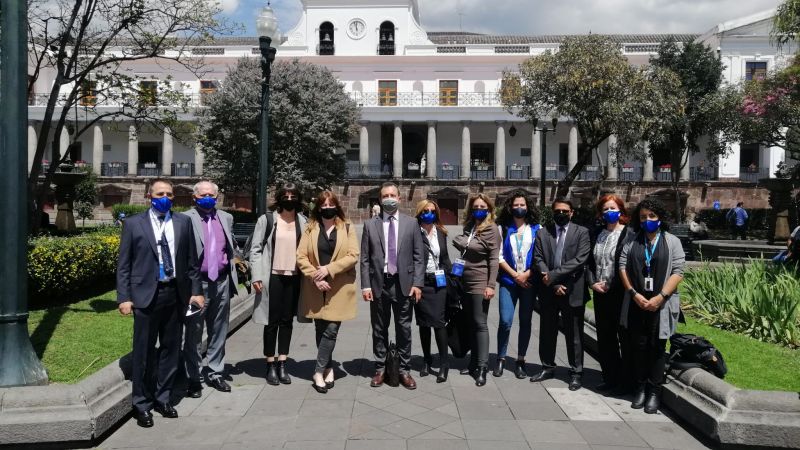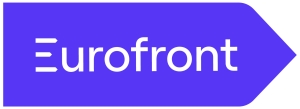News
From 11 to 15 October, the government of the Republic of Ecuador received a delegation from the EUROFRONT team, a programme financed by the European Union, in order to hold meetings with government authorities and visit the Rumichaca border crossing. This crossing is located between the cities of Ipiales, Colombia and Tulcán in Ecuador and was designated as a pilot location for the development of this programme.

The visit consisted of learning about the opportunities of the project in the country and in the prioritised locality in terms of integrated border management and the prevention and fight against the smuggling of migrants and human trafficking, as well as specifying the paths of action in each element.
During their visit, experts from the International and Ibero-American Foundation for Administration and Public Policies (FIIAPP), the International Italian-Latin American Organisation (IILA) and the International Organization for Migration (IOM) who lead the implementation of the programme held meetings with different areas of government where they jointly analysed the challenges that the country faces in the issues covered by the project, the current conditions of the actors present at the border and the impact that the planned activities might have.
In Quito, the programme team met with the Delegation of the European Union in Ecuador, as well as officials from the Foreign Ministry and the Interior Ministry to carry out an exchange on technical and programmatic aspects of the programme, which is making its first visit in person to the country since the mobility restrictions imposed by COVID-19 were relaxed.
“Our intention is to give importance to all international cooperation processes. We believe that the European model of Integrated Border Management is valuable for the system that we want to develop in Ecuador,” said Juan Francisco Loaiza, Under Secretary for Migration in the Ecuadorian Interior Ministry during the meeting, while John Game, Under Secretary of Public Security at the same Ministry highlighted the importance of this type of programmes based on international cooperation: “International cooperation allows us to identify critical issues and gaps that we can address with the good practices presented to us,” he said.
Charles-Michel Geurts, the European Union Ambassador to Ecuador, added: “We are extremely pleased with the reception that this programme has had, which will allow us to contribute to security, respect and the protection of the human rights of migrants in the context of human trafficking and migrant smuggling together with our partners in Ecuador.”
After the meetings with the Ecuadorian government authorities, the delegation travelled to Tulcán to visit the Rumichaca border crossing, where they were able to exchange experiences with border officials and government authorities from the Province of Carchi and from the border point in order to get to know the situation on the ground. The technical team held meetings with the Ecuadorian National Customs Service, Agrocalidad, the Ecuadorian National Police, the Armed Forces and migration authorities, with whom they discussed findings and recommendations and delivered human trafficking prevention materials designed to support the efforts of the Ecuadorian government in raising awareness among the local population.
“The visit to Rumichaca has allowed us to gain first-hand knowledge on the operation of the border post and the challenges that the authorities have to face at this border crossing. This will allow us to identify the needs on which we can work with the authorities in order to undertake our activities,” said José Antonio Cambronero, Director of Component I of the EUROFRONT programme during the visit.
Laura Estomba, IOM Argentina Protection Specialist and Regional Coordinator of Component II of the EUROFRONT programme, stressed that “we understand that an improvement in border management also implies a reduction in the smuggling of migrants and contributes to the reduction of human trafficking. This complementary aspect of the two components in this context of opening borders, after the pandemic, will help make migration safe, orderly and regular.”
The importance of identifying the needs of border crossing institutions, specifically to strengthen the capacities of CENAF (the National Centre for Border Assistance), was also highlighted “in order to improve this inter-institutional coordination that is required to achieve comprehensive and efficient border management,” said Liseth Lema, Coordinator of Border Management and Information Management at IOM Ecuador. Coralia Saénz Inoco, IOM Ecuador Focal Point on Trafficking in Persons, also stated that Component II is working jointly with the Ecuadorian government on information systems. “Right now we are finalising a process to develop manuals for the REGISTRATT and SISEGETT systems, which are provided for in both the organic law on human mobility and in the action plan against human trafficking,” said Saenz Inoco.
The information obtained and the exchange of experiences during this technical visit made it possible to learn about the work carried out at this border crossing and will mean that experts designated in this area will be able to define EUROFRONT’s strategic lines over the coming months.
Line of action
Social media news

